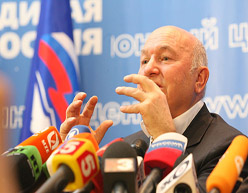Luzhkov revisits old policies to battle increasingly negative effects of the economic crisis on the city

Yuri Luzhkov, the powerful mayor of Moscow, the Russian capital city, has introduced a series of new policy measures, including the reintroduction of flee markets and banning of all city’s law-enforcement officials from haranguing small businesses, as the City Hall battles the rising negative economic and social fallouts from the increasingly devastating global financial crisis in Moscow and the rest of the country.
Veering away from the policy in the economic boom era that led to the closures of several open-air markets across Moscow and its environs — a vestigial practice from the deficit-ridden 1990s that was later condemned in the times of financial abundance and prosperous economic welfare as ‘unhygienic, uncivilized and fertile breeding grounds’ for all sorts of crimes, the City Hall has now ordered heads of territorial districts to open at least a flee market within their jurisdictions to allow Muscovites to buy and sell goods and other household items which they find redundant or needed in their houses.
According to the Mayor’s Office, this policy will generate employments for Muscovites because it is better for people to be engaged in any form of entrepreneurship today than stand in queues for free social handouts. Commenting on the City Hall’s new policy, Vitaly Mikhailichenko, the deputy head of the City Government’s Department for Consumers Market, said at least 10 of such markets will be created in the city. “The parameters and other details of the realization of this resolution, including the exact locations of these markets in each of the city’s 10 territorial districts, will be finalized in the next few days.”
Another boon to private entrepreneurship in Moscow also came from the Mayor’s Office, which has banned all the law-enforcement and other government agencies in the city from any inspection of small- and medium-sized businesses in the capital in 2009. Such inspections often lead to extortion of bribes and other illicit payments from the SMEs, thus constituting an extra financial burden for them.
Observers have hailed this measure as ‘timely and revolutionary,’ noting that over 20% of the city’s SMEs have been hard-hit by the crisis, while the remaining 80% are just trying to hang on. “It is not a secret that such inspections often cause neurotic atmospheres in business environments, distracting companies CEOs and their employees from their core tasks,” Mikhail Vyshegorodtsev, the head of the City Hall’s SME Support and Development Department, said. “In these crisis times, the city authorities have no other alternatives than to protect the SME sector. Therefore, this is a timely policy.”












 Web design,
Web design,